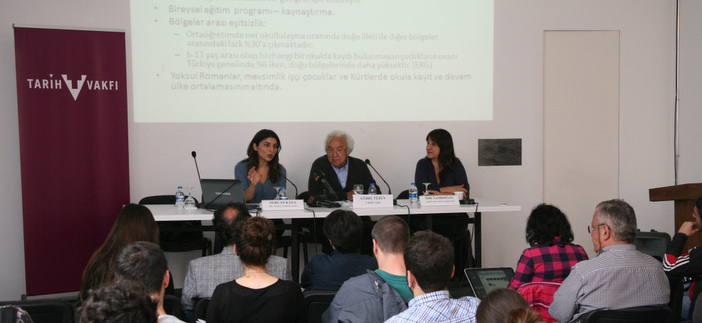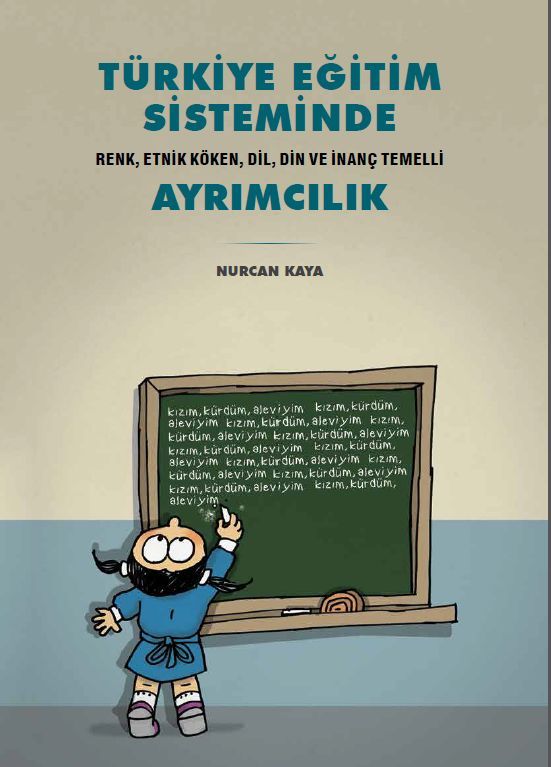Türkiye’de eğitim: Daha dindar, daha milliyetçi


Azınlık Hakları Grubu (MRG) ve Tarih Vakfı’nın ortaklığıyla, Uluslararası Azınlık Hakları Grubu Türkiye Koordinatörü Nurcan Kaya tarafından hazırlanan çalışma, 1 Mart 2014’ten bu yana yürütülüyor. Çalışma kapsamında, 17 sivil toplum örgütüyle birlikte ‘Eğitimde Ayrımcılığı İzleme Ağı’ kuruldu. Sivil toplumun da desteğiyle, eğitimdeki ayrımcı uygulamalar takip edildi. Dört çalıştay düzenlendi. Rapor, çalıştaylar, mağdurlarla yapılan görüşmeler, raporlar, mahkeme kararları ve medyada yer alan haberler üzerinden yapılan çalışmayla hazırlandı.
Paradigma değişmeli
Rapor, öğrencilerin eğitim ve öğretimde karşı karşıya kaldıkları ayrımcı uygulamaları gözler önüne seriyor. Eğitim sisteminde eşitsizliğin ve ayrımcı uygulamaların ortadan kaldırılmasına yönelik zaman zaman olumlu adımlar atılmış olsa da, sorunların kökten çözümü ve eşitliğin etkili bir şekilde sağlanması için temel bir paradigma değişikliğine ihtiyaç duyulduğu tespitinde bulunuyor.
Rapor, ayrımcılığın giderilmesi konusunda etkili mekanizmaların kurulması uyarısında bulunuyor.
“Eğitim alanında yaşanan bu sorunların giderilmesi konusunda, son yıllarda bazı olumlu adımlar atılmıştır. Ancak eğitim sistemindeki etnik köken, dil, din ve inanç temelli tüm eşitsizliklerin kaldırılması için kökten ve kalıcı reformlar henüz gerçekleştirilememiştir.
Anadilini öğrenmek ve anadilinde eğitim görmek, din ve inanç özgürlüğüne saygı gösterilmesi, eğitime erişim ve fırsat eşitliğinin güvenceye alınması, okullarda taciz ve diğer ayrımcı muamelelere maruz kalan öğrencilerin korunması gibi meseleler, çözüm beklemektedir. Müslüman Türkler dışındaki topluluklar hâlâ müfredatta ve ders kitaplarında yer almamakta ya da olumsuz referanslarla anılmaktadırlar. Eğitim sisteminde ayrımcılıkla mücadele için etkili hukuki ve idari yollar, mevcut mevzuatta bulunmamakta, var olan mekanizmalar da etkili bir şekilde uygulanmamaktadır.”

Sistem, 2010’dan sonra dindar
Rapor, özellikle AKP iktidarları döneminde, eğitim sisteminde sık sık yapılan değişiklik ve düzenlemelerin yarattığı sonuçları da tespit ediyor. Rapora göre, eğitim sistemi düzenlemelerinde, çocuğun üstün yararının korunmasından ziyade ideolojik yaklaşımlar belirleyici oldu ve 2010’dan itibaren ‘dindar’ ve ‘milliyetçi’ bir gençlik yetiştirmenin aracı haline geldi.
Rapor, eğitim sisteminde yapılan müfredat değişikliklerine de dikkat çekiyor:
“Son yıllarda müfredatta, ders kitaplarında ve etkinliklerde dinî referansların arttığı dikkat çekmekte, ‘Türk İslam’ sentezi ideolojisinin yeniden kurgulanarak öğrencilere empoze edildiği gözlemlenmektedir.”
Seçmeli dersler
‘Yaşayan Diller ve Lehçeler’ seçmeli dersinin, ‘Hz. Muhammed’in Hayatı’, ‘Kur’an-ı Kerim’, ‘Temel Dini Bilgiler’ ve ‘Matematik Uygulamaları’ vb. derslerle aynı dönemde müfredata koyulmasının, bu derslerin tercih edilme oranına etki ettiği düşünülmektedir. 2013-2014 verilerine göre, öğrencilerin sadece yüzde 0,70’i ‘Yaşayan Diller ve Lehçeler’ dersini seçti.
-İçerik planlanırken dil gruplarının temsilcileriyle fikir alışverişinde bulunulmaması, tanıtım için gerekli bilgilendirme çalışmalarının yapılmaması ve okul idarecilerinin ve yerel bürokrasinin olumsuz tutumlar sergilemesinin de bu derslere olan ilgiyi olumsuz yönde etkilediği ifade edilmektedir.
-Öncelikle, ‘Yaşayan Diller ve Lehçeler’ seçmeli dil derslerinin uygulama ve planlaması sırasında, dili konuşan grupların temsilcileriyle herhangi bir istişare yapılmamıştır. Dolayısıyla, bu dersler katılımcılıktan uzak bir şekilde geliştirilmiştir.
-Diğer seçmeli derslerde olduğu gibi, bu derslerden birinin bir okulda açılabilmesi için en az 10 öğrencinin dersi tercih etmesi gerekmektedir. Özellikle, nüfus olarak daha az veya dağınık olan ve anadili öğrenme konusunda henüz yeterli ilgiyi gösterebilecek durumda olmayan toplumsal gruplar için bu sınırlama, büyük bir sorun olarak görülmektedir.
-MEB’in herhangi bir mekanizma ve bütçe oluşturmaması nedeniyle, bu derslerin materyallerini hazırlama işini enstitüler ve STK’lar üstlenmiştir.
-Ders kitapları ve materyallerinin hazırlanması için MEB tarafından herhangi bir bütçe sağlanmamış, hatta kurumlar hazırladıkları materyallerin telif hakkını MEB’e hibe etmişlerdir.
-Öğretmen yetiştirilmesiyle ders kitap ve materyallerinin hazırlanması konusunda, sorumluluğun neredeyse tamamen ve herhangi bir bütçe ayrılmadan anadilleri konusunda çalışma yapan sivil toplum örgütlerine ve akademik bir kuruma bırakılmış olması, diğer seçmeli derslerin hazırlığıyla karşılaştırıldığında büyük bir haksızlığa yol açmaktadır.
Anadili Türkçe olmayan çocuklara ‘öğrenme güçlüğü’ teşhisi konuluyor
Anadili Türkçeden farklı bir dil olan çocukların zihinsel engelli teşhisiyle özel eğitim kurumlarına yönlendirilmesi, çeşitli görüşmelerde ve toplantılarda sıklıkla dile getirilen sorunlardan en çarpıcı olanıdır. Daha önce bazı STK’ların raporlarında da dikkat çekilen bu sorunun devam ettiği görülmektedir. Bir çocuğun özel eğitime ihtiyaç duyup duymadığı konusunda rapor hazırlayan rehberlik ve araştırma merkezlerinin (RAM), çocukların anadil sorununu dikkate almadan raporlar hazırlayabildiği ve bu şekilde hazırlanan raporların çocukların eğitim hayatını ve geleceğini etkileyen önemli bir hata olduğu anlatılmaktadır. RAM’ların Türkçe olarak değerlendirme yaptığına ve anadili Türkçe olmayan çocuklara kolaylıkla ‘öğrenme güçlüğü çeken çocuk’ teşhisi koyduğuna dair şikâyetler sıklıkla paylaşılmaktadır.
Bir müzik öğretmeni, bir kaynaştırma öğrencisini sınıf içinde izledikten bir süre sonra, çocuğun tek sorununun anadilinin Türkçeden farklı bir dil olması olduğunu fark ettiğinden söz etmektedir.
Romanların yaşadığı sıkıntılar
Roman çocukların okulu terk etmelerinde ya da okula devamsızlık göstermelerindeki en önemli sebepler, şu şekilde sıralanmaktadır:
*Ebeveynlerin, eğitim ve bilinç eksikliğinden dolayı, eğitime gereken önemi vermemesi.
*Erken ve çocuk yaşta evlilik yapma.
*Çocuk işçiliği, çocuğun çalışarak aile bütçesine katkıda bulunma mecburiyeti.
*Ebeveynlerin çocuğun temel eğitim giderlerini (kırtasiye, okul forması) karşılamakta zorlanması.
*Tek odalı evlerde yaşam, çocuğun ders çalışma koşullarına sahip olmaması.
*Yoksulluk nedeniyle çocukların okula kahvaltı yapmadan gitmesi ve derslere konsantre olamamaları.
*Roman çocukların kimliklerinin yaygın olarak geç çıkarılması nedeniyle, çok sayıda öğrencinin gerçekte 14-15 yaşlarındayken 7-8 yaşındaymış gibi okula başlaması ve bunun hem Roman çocuklar, hem de aynı sınıftaki diğer çocuklar için uyum sorununa yol açması.
*Çocukların ev ödevlerine yardım edecek kimsenin olmayışı.
*Performans ödevleri olarak bilinen uygulama ödevlerinin internet üzerinden yapılması. Roman çocukların büyük oranda internete erişiminin olmaması nedeniyle, bu ödevleri yapamaması.
*Okullarda ayrımcı, ötekileştiren muameleye maruz kalma.
Romanlar ve Roman olmayanların bir arada yaşadığı bir semtte bulunan ilkokulda, sadece Roman öğrencilerin okuduğu görülmektedir. Bu semtte yaşayan ve Roman olmayan aileler, çocuklarının Roman çocuklarla aynı okulda okumasını istemedikleri için ikametlerini kâğıt üzerinde başka bir semte aldırmaktadırlar. Bu da Romanlar ve Roman olmayanların bir arada yaşadığı semtteki okulu, sadece Roman çocukların gittiği bir okula dönüştürmekte, böylelikle Roman çocukların okul ortamı, toplumun diğer kesimlerinden tamamen ayrışmaktadır.
Roman çocukların eğitim hakkından yararlanması konusunda son yıllarda yaşanan en önemli sorunlardan biri, herhangi bir zekâ geriliğine sahip olmadıkları halde pek çok Roman öğrencinin, RAM raporu alınarak özel eğitim kurumlarına kaydedilmesidir.
Zorunlu din dersleri
İlkokul 4. sınıftan itibaren zorunlu olarak okutulan ‘Din Kültürü Ahlak Bilgisi’ dersi, Anayasa ve uluslararası sözleşmeler tarafından güvenceye alınan din ve vicdan hürriyeti, eğitim hakkı ve ayrımcılık yasağı gibi pek çok temel insan hakkının ihlal edilmesine yol açmaktadır.
Eğitim Sisteminin Görmediği Bir Halk: Afro-Türkler
Ders kitaplarında yer almayan gruplardan biri Afro-Türklerdir. Cumhuriyet tarihi boyunca ders kitaplarında hiçbir şekilde adlarının anılmaması, âdeta ‘yok’ muamelesi görmeleri, Afro-Türkleri rencide etmektedir. Çocukların da renkleri nedeniyle okullarda sıklıkla tacize uğradıkları ve bunun da okulu terk etmelerinde önemli bir rol oynadığı anlatılmaktadır.
Azınlık okulları sorunlarla boğuşuyor
Raporun en dikkat çekici bölümlerinden biri, azınlık okullarının içinde bulunduğu durum. Raporda, son yıllarda yapılan iyileştirmelere rağmen, azınlık okullarının statü sorunu ve karşı karşıya kaldığı mali zorluklara dikkat çekiliyor. Müdür yardımcısı, ders kitaplarının temini ve müfredat sorunlarına da çözüm bulunabilmiş değil.
Statü sorunu
Azınlık okulları, yabancı ya da özel okullar değillerdir; ancak buna rağmen kimi hallerde yabancı, çoğunlukla da özel okul muamelesi görürler. Azınlık okullarını tanımlayan, hak ve yükümlülüklerini düzenleyen bir kanun bulunmamakta, bu okullar özel öğretim kurumları mevzuatına tâbi tutulmaktadırlar. Kâr amacı güden özel okul olmadıkları halde, özel okul muamelesi görmek, azınlık okullarını dezavantajlı duruma düşürmektedir. Azınlık okullarının özgün bir statüye sahip olmamaları, zaman zaman bürokraside de karışıklıklara yol açmakta, bu karışıklıkların olumsuz yansımaları gözlenmektedir.
Mütekabiliyet
Azınlık okullarına dair politikalar geliştirilirken “mütekabiliyet ilkesi”nin yanlış ve haksız bir şekilde uygulanması suretiyle, Batı Trakya’da bulunan Türk okullarına uygulanan politikalar esas alınmaktadır.
Lozan Antlaşması ve uluslararası sözleşmelerde yer alan ve demokratik ülkelerde uygulanan standartlar esas alınması gerekirken, Batı Trakya’daki okullara uygulanan standartların belirleyici olması, uluslararası hukuka aykırı politikaların geliştirilmesine ve azınlık okullarının haklarının ihlal edilmesine yol açmaktadır. Bu aynı zamanda azınlıklara “yabancı” muamelesi yapıldığı anlamına gelmekte ve onları rencide etmektedir.
Maddi zorluklar
Bazen yabancı okul, bazen de özel okul muamelesi gören azınlık okullarına devlet bütçesinden pay ayrılmamaktadır. Öğretmenler ile tüm diğer çalışanların maaşları, okulun idari giderleri, ısınma, su, elektrik, kırtasiye gibi giderler okulların kendileri tarafından karşılanmaktadır. Bu giderler, okulların bağlı olduğu vakıflarca ayrılan bütçenin yanı sıra, veliler ve diğer kişilerin bağışlarıyla karşılanmaktadır. Ancak, yine de bazı okulların idarecileri çalışanlarının maaşlarını ödemekte zorlandıklarını belirtmektedir.
Teşvik desteği
2014 yılında özel öğretim kurumlarında öğrenim görmekte olan öğrenciler için, öğrenci başına okullara ödenen özel okul teşvik bursu düzenlemesinden azınlık okulları da faydalandırılmıştır. Azınlık okullarına yapılan ödeme, diğer okullara göre düşüktür; zira, pek çok azınlık okulunda okuyan öğrenci sayısının özel okullardakilere oranla daha düşük olması nedeniyle, öğrenci sayısının baz alınmasıyla yapılan ödemeler azınlık okullarının bütçelerinin ancak küçük bir kısmının karşılanmasına imkân tanımıştır.
Ermeni okulları, kendilerine yapılan ödemelerle yıllık giderlerinin ancak cüzi bir kısmını karşılayabilmiştir. Örneğin 222 öğrencisi bulunan ve yıllık bütçesi 2.500.000 TL olan bir Ermeni lisesine, özel okul teşvik bursu uygulaması kapsamında toplam 663.320 TL ödeme yapılmıştır.


